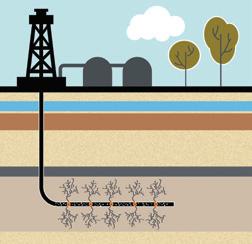POLICY
Save America’s Oil and Gas Industry
I
n light of Saudi Arabia’s and Russia’s current attempts, as well as those of their corporate and government-sponsored accomplices, to kill the American oil and gas industry, it’s important for Americans to be reminded of — or be told about for the first time — what their home-grown energy industry has meant to the country and the world. At a victory dinner on Nov. 21, 1918, celebrating the end of WWI, the British Minister of Foreign Affairs, Lord Curzon, declared that the “Allied cause floated to victory upon a wave of oil.” Eighty percent of that oil was supplied by the U.S. To ensure there was sufficient oil to serve the energy needs of the Allied military forces, the various war industries and the needs of
supply what is needed if absolutely necessary if contention of French is proved that engines have much longer life . . . it is unquestionably our duty to supply fighting grade which I have said will be manufactured in this country.” U.S. oil producers did their part. Again, during WWII, reliable access to U.S. crude oil gave the Allies their strategic advantage against the Third Reich and the Axis Powers. Marine shipments of crude oil from Texas to the East Coast for the war effort had been coming under constant deadly attacks by German U-boats. In 1942, Secretary of the Interior Harold Ickes, who was also administrator of the Petroleum Administration for War, proposed building a pipeline across the U.S. to avoid the
civilians, President Woodrow Wilson appointed Mark Requa, a Stanford-educated engineer and successful mining operator from San Francisco, to be the first Fuel Administrator, the precursor to today’s Secretary of Energy. Wilson wanted to create a wartime relationship between the government and the oil industry. A cablegram from Requa, dated Sept. 3, 1918, to the U.S. representative to the Inter-Allied Petroleum Conference illustrates the collaboration between the private sector and government. Requa says that the U.S. oil industry “shall probably be able to
ongoing risk of Germany’s sinking oil tankers off our shores. Ickes formed a government-industry consortium to build the Big Inch and the Little Big Inch pipelines to keep the fuel for Allied ships, tanks and vehicles flowing. The pipelines delivered thousands of barrels of oil and refined products from the heart of the East Texas oil field to our eastern distribution hubs. The Petroleum Administration for War considered the Inch pipelines to be part of “the most amazing government-industry cooperation ever achieved.” U.S. oil producers did their part. (continued on page 43)
42
SHALE MAGAZINE MAY/JUNE 2020
While all eyes are on the global pandemic, our nation’s military superiority, our citizens’ quality of life and our economic stability are threatened Elizabeth Ames Coleman is a former chairman of the Texas Railroad Commission and Phil Bryant is the former governor of Mississippi. This story was originally published on Forbes.com.
PANARAMKA/STOCK.ADOBE.COM
By: Elizabeth Ames Coleman and Phil Bryant










